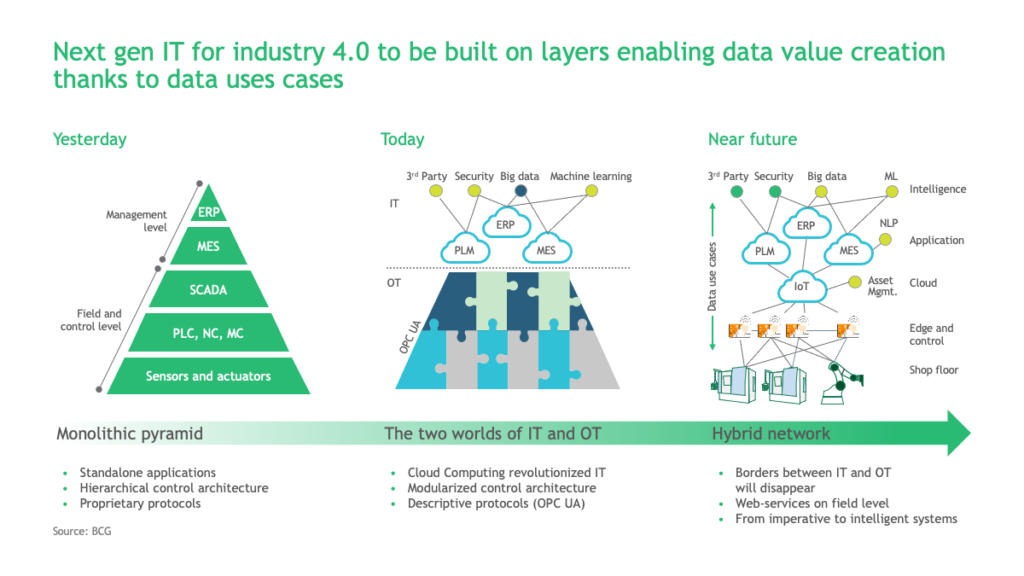Manufacturing industries are facing a range of growing challenges, driving them to accelerate their digital transformation towards the Industry 4.0 with fully bionic capabilities. A key constraint in this undertaking is costs, with businesses having to minimise spend as much as possible to remain competitive. Many are realising that digital transformation is the key to streamlining operations while encouraging growth, but effective adoption remains a challenge for some. To relieve cost pressures, manufacturers are looking to reduce process variability, improve quality, reduce waste and optimise their use of raw materials.
A wide range of manufacturing industry players are also having to tackle challenges related to rapidly shifting demands. This calls for small batches to be delivered at high speeds in order to meet changing trends, shorter logistic and time-to-market cycles, as well as more resilient supply chains.
On top of having to operate with greater agility, efficiency and quality, emerging legal and societal factors are also applying pressure. The most high-profile example is the COVID-19 pandemic, which has forced organizations to pivot and act on crisis response plans, while also having to limit emissions and environmental footprints simultaneously. Changing trade policies are adding further pressure to the mix, requiring businesses to adapt their value chains accordingly.
Digital transformation may hold the key to achieving industry 4.0 status, but many organizations lack the necessary skills and capabilities to implement technologies like Edge Computing and augmented reality (AR) at scale.
The first step in solving this problem is for businesses to pinpoint their primary inhibitors to transformation, which will be crucial to identifying the most effective solution.

Pinpointing the inhibitors
A prevalent example of an inhibitor faced by many organizations are the monolithic, vertically integrated applications that still exist at the core of many IT architectures today. These applications make it difficult to access business functionality because they are so tightly woven into the existing architecture, inhibiting an organization’s ability to innovate and respond rapidly to changing demands. The inflexibility caused by these applications has the knock-on effect of making it difficult to create new user experiences in a dynamic way. Often underpinning these issues are complex legacy platforms, compounded by long update cycles.
Data handling and hygiene are also key inhibiting factors for industry players, with many operating with isolated and inconsistent sets. These problems have been able to proliferate in enterprise businesses where data is scattered across various systems, or when there are multiple sets of inconsistent data relating to the same object. The data challenge is commonly worsened by the lack of a governed and consolidated view, as well as the lack of necessary capabilities for data management and advanced analytics.
Outdated point-to-point interfaces then offer up another set of challenges to organizations looking to transform. Operating with a complex architecture where each data exchange between applications is specific can require thousands of interfaces, adding massive complexity when many are batch-based and slow-moving.
Putting data platforms at the heart of transformation
For organizations to begin beating their inhibitors and driving a successful digital transformation at scale, data platforms must be prioritized. We have identified this as a major theme among organizations that have conducted successful transformations, with 76% of best performing companies ensuring a flexible, modular data platform. A BCG client that achieved a successful transformation at scale said this:
There was data hidden in many places. Fundamental redesign of the architecture along with de-averaging the level of security was needed.
"To bring this all together, organizations operating with monolithic, standalone applications, hierarchical control architectures and proprietary protocols need to evolve. Successful digital transformation at scale relies upon IT that has been modernized by cloud and edge computing and overseen by modularized architectures. Taking these crucial steps will unlock hybrid networks of the future for industrial players, where borders between IT and OT progressively disappear, web-services are available at the field level and systems become intelligent rather than imperative.

The results of seamlessly linking OT and IT are impressive, supporting organizations to efficiently build platforms that support new use cases. The adoption of cloud and edge technologies serves as a useful example for how OT and IT synergies can be strengthened, while also engendering a ‘fail fast or scale’ approach that is vital to innovation. Similarly, DevOps and automation can promote optimized delivery, while new ways of working can be adopted through Agile approaches.
In supporting clients on their industry 4.0 journeys, we have observed some striking successes achieved when OT is supported with digital know-how and tangible benefits linked to building data & digital platforms. These range from a 70% reduction in defect numbers during production, a 25% increase in overall productivity, as well as a 50% reduction in time to market.
Why work with BCG?
BCG can play a critical role in enabling digital transformations for industry players, offering a wide range of combined skills to support strategic business priorities. Crucially, we have a proven track record of successful digital transformations at scale.
For example, BCG worked with a leading mining player to transform an outdated client business solution. The organization was failing to deliver on business objectives, struggling with poor data hygiene and management, inefficient ways of working and heavily customized legacy technology. Our teams established the need for the challenge to be reframed, and for a top-down approach to be taken that would implement new technology and business modernization.
We analyzed seven business processes that were supported by the existing client business solution, identifying that the data they generated was insufficient to achieve their strategic objectives. A multidisciplinary team of digital consultants, designers and IT architects then leveraged NextGen ERP to establish a set of options to address the challenge, before pinpointing the right solution by mapping the financial benefits. As a result, the team established a measured approach and set the foundations for a successful delivery.

Our BCG Digital business segment is comprised of expertise from over 900 digital business builders, focusing on disruptive innovation and new ventures. These skillsets are complimented by the knowledge of over 650 IT experts and architects from our BCG Platinion teams, with the support of over 2,500 digital consultants from our core BCG function.
About the Authors
Norbert is Digital Data Platform Leader for EMESA (Europe, Africa, South America) of BCGX. He oversees major Digital Transformation programs to help some of the world’s leading organizations leveraging quality and accessible internal and external data. His transformative mindset has helped clients across a wide range of sectors to build digital advantage toward industry 4.0.
Llorenç Mitjavila Ribera
Managing Director and PartnerBarcelona
Régis is an expert in reshaping industries through cutting-edge technology by people for people. Helping to scale BCG Platinion in Paris, he is an expert in new software architecture and data as a strategic asset to prepare for the wide adoption of new innovative tech. His experience includes 15+ years of operational management, ten years of innovation project leadership and seven years of tech consulting.
Guillaume Desmartin
Platinion Associate DirectorParis
Karim Chaabouni
Managing Director and PartnerParis


